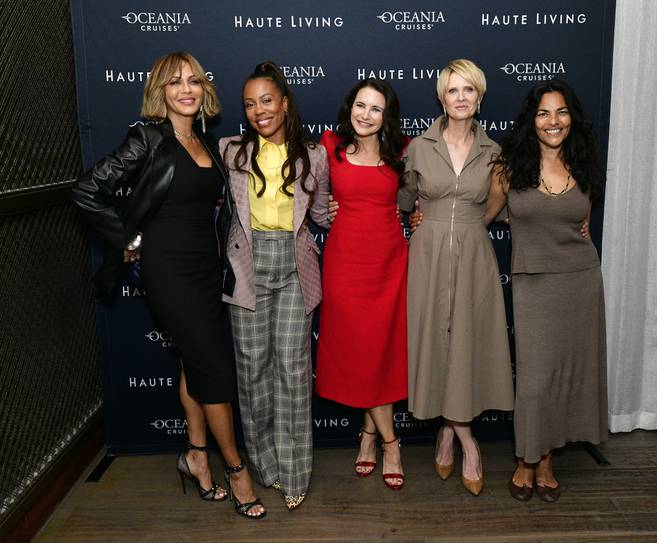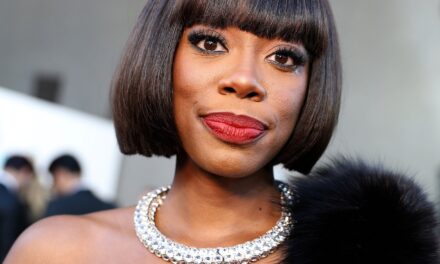
Actor Nicole Ari Parker and I grew up in Baltimore around the same time, but we never met. Because it’s Smalltimore, though, I knew people who were like, “Didn’t you go that party at the thing where she was that time?” or “Girl, I used to take dance lessons with her.”
We didn’t run in the same circles — Parker went to Roland Park Country School, I was a public school kid — but I can now say she is, sort of, part of a group of old friends. Parker can currently be seen as socialite, filmmaker and glamorous mom-about-town Lisa Todd Wexley in “And Just Like That…,” the reboot of HBO’s groundbreaking “Sex and the City” series and two subsequent movies, one of which was great, while the other was yeet-it-into-the-blazing-sun awful.
Lisa’s regular presence around the brunch table with Carrie (Sarah Jessica Parker), Charlotte (Kristin Davis) and Miranda (Cynthia Nixon) is notable, not just because of the absence of the gang’s previous gal pal Samantha (Kim Cattrall), but because the Michael Patrick King-produced franchise stopped pretending that its core group of gals wouldn’t run across nonwhite people in their well-to-do New York environment, if not their circle. Previously, the only significant Black characters in the series were that doctor Blair Underwood played who Miranda dated, and the chef who forbade Samantha from sexually objectifying … er, dating her brother. (Cringe cringe cringe.)
Does it seem unlikely that the ladies went from having no friends of color to each having a Black or brown friend or lover? Sure. And does the casting of Nicole Ari Parker as Charlotte’s mom friend Lisa; Karen Pittman as Miranda’s law professor Nya; Sara Ramirez as Miranda’s new partner Che; and the luminous Sarita Choudhury as Carrie’s realtor Seema seem like a cynical answer to the decadeslong criticism about “SATC’s” monochromatic personnel? It certainly did during the first season of “And Just Like That…”
But during the second season, the fifth episode of which debuted Thursday, these newer characters have mostly settled into a groove within the group, especially Lisa and her rich banker husband Herbert (Christopher Jackson, who was in “Hamilton”). I do not hang with many socialite hedge fund folks, but I recognize storylines about respectability politics, bougie older Black relatives with a prescribed formula for conduct in polite society and the humiliating uncertainty of hailing a cab while Black. And while there are current shows such as “Harlem” and “Run The World” already highlighting the inner lives of successful Black women in New York, it’s interesting to see the franchise wrestle with some of those issues.
I relate to Lisa having to navigate her glittering life while trying to meet the rigid expectations of older bougie Black people, like mother-in-law Eunice (Pat Bowie), who disapproves of Lisa’s zebra print skirt and her daughter’s unbraided natural hair, or her father-in-law (the ever dapper Billy Dee Williams), who disapproves of Herbert’s money-driven career. I won’t name names, but will just say I’ve had my hair and clothes policed by some loving but … critical elder family members with the suggestion that it was bad for the culture.
So far this season, I can’t tell if the writers really have something to say about the demands that wealthy and powerful Black people must meet within their own communities and in white ones, or if they’re trying to make Eunice a modern Black version of Bunny (Frances Sternhagen), Charlotte’s awful, racist, WASP-y former mother-in-law who shot down Charlotte’s plans to adopt a daughter from China by saying “I don’t enjoy Mandarin food and I don’t enjoy a Mandarin child.” Yikes.
But with the exception of a few hiccups, this season’s a lot more sure of itself. For instance, last week Carrie had to admit her ageism when she was personally insulted that 70-something former mentor Enid (Candice Bergen) implied they’re contemporaries. That rang true: When youth has always been part of your CV, any implication that you’re in the AARP set seems like fighting words, no matter how factual it is.
I’m still not sure the writers have gotten everything right, like the aftermath in the scene Herbert loses his cool with the cab driver who refuses to pick him up in front of his young daughter, and his terribly judgmental mother walks away before he can embarrass her in front of her Alpha Kappa Alpha sorors. I couldn’t tell if the show agreed with him or Eunice. But I’m invested in Lisa and her family now, like they’re my fancier cousins who send embossed holiday letters about their vacation on Mustique.
I was delighted to have characters to relate to since I’d initially avoided “And Just Like That…” That wasn’t just because of my admitted squeamishness about how it might handle the lives of Black and brown people as full humans and not just acolytes to the white women at its center. I’d been warned that Carrie loses her husband, Big (Chris Noth) to a heart attack, like I lost mine, and, as a friend told me “This show is not for you.” But the series has nailed so much of its grief storyline that it seems eerily lifted from my life, from the awkward condolences to the painful dating and even crying while narrating the part of your grief memoir when your husband dies. (The part where Carrie inherits millions of dollars, sadly, is unfamiliar.)
“And Just Like That…” still isn’t perfect: I’m having trouble reconciling previously dogged and resolute attorney Miranda with this current unsure, silly version who’s dithering around behind the unpleasant Che, a comedian who doesn’t do comedy well. And Carrie remains frustratingly prudish for a sex columnist — she got her whole podcast shut down because she refused to say the word “vagina” in a sponsor’s ad. But I guess the aforementioned inheritance softens the blow. But there are familiar flashes of the women who charmed and frustrated me more than two decades again, drawing me in like old friends. I’m pleased that they’re back, and to make the acquaintance of new ones, like Lisa.
Sign Up for Alerts
Get notified of need-to-know
info from The Banner




